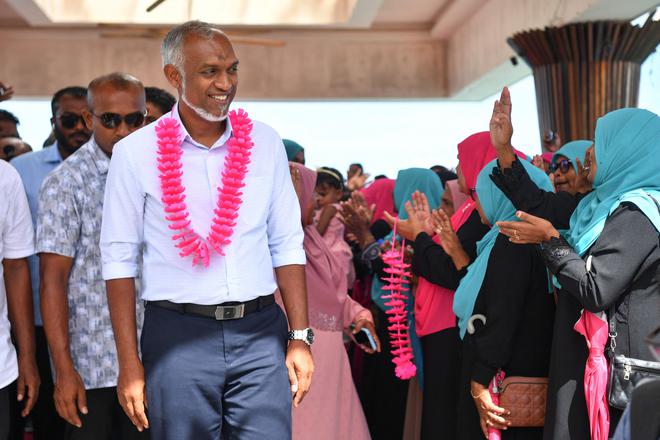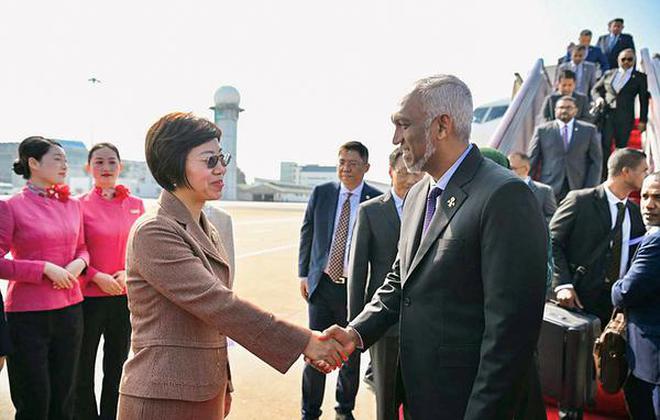The story so far: An online war of words set off by Prime Minister Narendra Modi’s posts pitching for tourism in the Lakshadweep islands has dramatically escalated into a diplomatic row between India and the Maldives, worsening the already strained relationship between the Indian Ocean neighbours.
What began as a social media controversy over disparaging remarks against the country and Mr. Modi, with one post calling the PM a “clown,” spilled into the real world last week, leading to the suspension of three Maldivian Ministers at the centre of the row amid severe public backlash on social media. The row intensified on Monday, January 8, as India expressed serious concerns through diplomatic channels, against the backdrop of travel industry players suspending bookings to the island nation and Indian users and celebrities trending the ‘boycott Maldives’ hashtag in protest.
Also read: View From India | India’s Maldives challenge
The latest episode is one of several recent incidents that throw light on the evident fault lines in India-Maldives ties. Bilateral relations have hit a rough patch since Mohamed Muizzu was elected President last year on the back of an ‘India Out’ campaign.
From ‘India First’ to ‘India Out’
The Maldives is a key maritime neighbour of India in the Indian Ocean Region (IOR), located 300 nautical miles from the Indian mainland (West coast) and 70 nautical miles from the Minicoy Island in Lakshadweep. The country’s location holds significant strategic importance to India, especially amid China’s growing engagements in the region.
Although Maldives-India ties have been mostly cordial over the years, there was a noticeable tilt towards China during the presidency of Progressive Party of Maldives (PPM) leader Abdulla Yameen from 2013 to 2018. It was under Mr. Yameen that China included the Maldives as a part of its Belt and Road initiative (BRI).
Bilateral ties improved significantly when Ibrahim Mohamed Solih of the Maldivian Democratic Party (MDP) took over the reins from Mr. Yameen in 2018.
Aiming to reset ties with “one of its closest bilateral partners,” Mr. Solih adopted an ‘India first’ foreign policy to establish a closer relationship with India in the areas of defence, security and economics. The Maldives “makes no apology” for close ties with India, he told The Hindu in a 2021 interview.
However, the growing proximity between New Delhi and Male and high-level military exchanges sparked concern in certain quarters, leading to an ‘India out’ campaign spearheaded by the Opposition. The critics of the Solih administration alleged that the government was compromising the sovereignty of the island nation and “allowing Indian boots on the ground.” The Opposition sharpened its attack after the government signed the Uthuru Thila Falhu (UTF) deal with India in 2021 to jointly develop the National Defence Force Coast Guard Harbour.
The anti-India campaign emerged as the main poll plank in the 2023 presidential race under the leadership of former pro-China Maldivian President Abdulla Yameen.

With a few months to go, PPM’s Mohamed Muizzu emerged as the joint Opposition candidate following a series of dramatic events which prevented former President Yameen from contesting the presidential election. A protege of the PPM chief, Mr. Muizzu was then serving as the Mayor of Male.
Mr. Yameen returned to prison and Mohamed Muizzu entered the poll fray.
Amid strong anti-incumbency sentiment and differences in the ruling coalition, Mr. Muizzu built on the ‘India out’ campaign to persuade voters. He promised to remove Indian troops from the Maldives shores and balance trade relations, which he claimed were heavily tilted in India’s favour.
He opted to pursue a new foreign and domestic policy after falling out with his mentor Mr. Yameen.He refused to be labelled pro-China and maintained that he was “pro-Maldives”, saying his government wouldn’tallow Indian, Chinese, or any other country’s military presence in the archipelago. He, however, signalled his intentions to build strong ties with Beijing, highlighting the benefits of Chinese assistance to the Maldives.
In September 2023, Mohamed Muizzu won the contest with 54% of the votes, and in November, took oath as the eighth President of the island nation.
Break from the past
The first signs of a shift in foreign policy following the regime change emerged when the new Maldivian President skipped India and instead travelled to Turkiye in November on his first official visit. The Ankara trip marked a departure from a long tradition of Maldivian heads visiting New Delhi first.
Mr. Muizzu has since travelled to the UAE and is currently on a five-day visit to China at the invitation of Chinese President Xi Jinping. The Maldivian President has termed China as its “valued ally and integral collaborator”, with the two countries inking around 20 important agreements to boost trade, development, and socioeconomic cooperation.

India asked to remove military presence
In his first address to the nation after taking oath, Mr. Muizzu insisted on the withdrawal of Indian soldiers from the Maldives as he pledged to safeguard the sovereignty and independence of the Maldives. The President’s remarks that the country “will not have any foreign military personnel” grabbed headlines in India, viewed as an attempt to officially turn the compass from his predecessor’s ‘India First’ policy to an ‘India Out’ policy.
A disappointed New Delhi urged the Maldives to look at the presence of its military personnel in the “proper perspective.” New Delhi maintained that about 75 soldiers were stationed in the Maldives to maintain and operate the Dornier aircraft and two helicopters gifted to the nation by the Indian government for humanitarian operations and providing medical support.
Editorial | A change for the worse: On the rapid decline in India-Maldives ties
The new President, however, made another formal announcement on this matter following his meeting with PM Modi on the sidelines of the UN’s COP28 climate summit in the UAE in December, claiming that Mr. Modi had agreed to his demand. While statements issued by the two governments didn’t mention any such agreement, sources in the Indian government countered the claim, saying the discussions on the issue were still “ongoing” and under the consideration of a core group set up after the Modi-Muizzu meeting.
Male’s hesitance to maintain defence ties with New Delhi was again evident from the absence of a Maldivian government representative in the latest round of the Colombo Security Conclave held in Mauritius last month. The maritime security group was set up in 2011 to promote a safe, secure, and stable Indian Ocean and includes Sri Lanka and Mauritius as members, besides India and the Maldives.
Revocation of water survey pact
A few weeks after it formally requested New Delhi to withdraw its military personnel from its shores, the Muizzu government caused a stir in political and strategic circles with its decision to revoke a key 2019 agreement with India for conducting surveys in Maldivian waters. The Memorandum of Understanding (MoU) for hydrographic surveying, signed during PM Modi’s state visit to the islands when President Ibrahim Solih was in power, backed the commitment of the two countries to maintain close cooperation in defence and maritime security.
The pact emerged as a symbol of strong defence ties, with the Maldives National Defence Force and the Indian Navy carrying out three joint surveys in 2021, 2022, and 2023. Critics of the Solih government, however, had expressed their reservations and claimed that the agreement was detrimental to national security.
In December, in keeping with his campaign promise to terminate agreements that were “harmful to the Maldivian sovereignty,” Mr. Muizzu announced that the pact will not be renewed. “The [Maldivian] administration believes it best for national security to improve the Maldivian military’s capacity to conduct such surveys, and protect such sensitive information,” Sun Online, a Maldivian news portal, quoted an official in the President’s Office as saying.
Abhijit Singh, Head of the Maritime Policy Initiative at the Observer Research Foundation, says that the Muizzu administration’s refusal to renew the pact seems less to do with the President’s sensitivities about sovereignty than with his special relationship with Beijing. “Getting Indian hydrographic ships out of Maldivian waters appears intended to aid China’s marine surveys of the surrounding seas,” Mr. Singh notes in his analysis.




.jpg?w=600)


